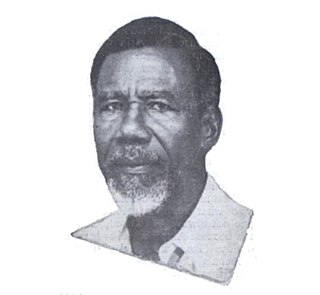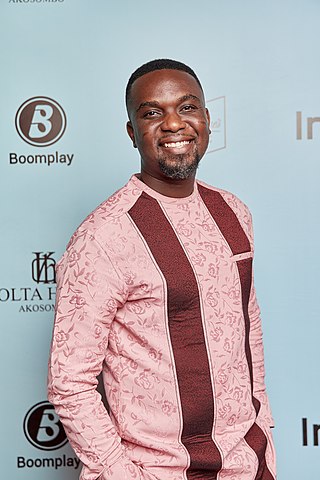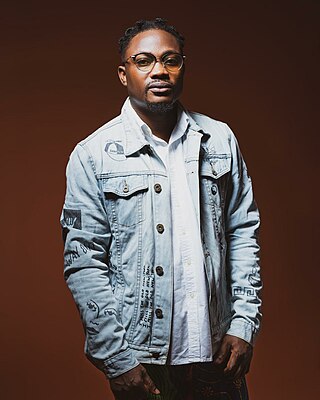
The regions of Ghana are the first level of subnational government administration within the Republic of Ghana. As of 2020, there are 16 regions, which are further divided for administrative purposes into 260 local metropolitan, municipal and district assemblies.

Emmanuel Andrews Sammini, known by his stage name Samini, is a Ghanaian reggae and dancehall recording artist from Wa, Ghana. His genre of music is a melodious mixture of high life, dance hall, reggae and hip-hop. He terms his brand of music "African dance hall". He signed his first record deal with Ashanti International. Samini started his record label after he left the aforementioned label.

Nii Amon Kotei was a Ghanaian sculptor, painter, musician, surveyor, and graphic artist. He is mostly remembered and celebrated as the designer of the coat of arms of Ghana. He was one of Ghana's leading artists.

Vice Admiral Mathew Quashie was a Ghanaian naval officer and was the twenty-ninth Chief of Defence Staff of the Ghana Armed Forces. He also served as the Chief of Naval Staff of the Ghana Navy from 3 April 2009 to 28 March 2013.

Charles Nii Armah Mensah Jr., is a Ghanaian reggae-dancehall artist. He is known by his stage name Shatta Wale, formerly Bandana. Shatta Wale changed his name to "Bandana'' after senior high school and released the hit track "Bandana from Ghana". The song made tremendous air waves in the Ghanaian music industry in 2004. Shatta Wale's sudden rise to the occasion happen in 2013 VGMA awards when he threw lyrical insults to VGMA now Telecel Ghana Music Awards ( TGMA)". because he proclaimed they robbed him of the Dancehall artist of the year to a female Dancehall artist Kaakie. Even though the song had vulgar lyrics, it was so anticipated by the media which created his musical breakthrough.

Theophilus Tagoe, popularly known as Castro, Castro Under Fire or Castro De D’Destroyer, was a Ghanaian hiplife recording artist and musician.

The Ankos Festival also known as Takoradi street carnival or Masquerade Festival is an annual event celebrated by the people of Sekondi-Takoradi, Ghana. Its main attraction is dozens of groups of people or teams dressing in wild outfits who display their skills and arts via dance. The festival is usually celebrated from 24–26 December of every year, and is popular with tourists.

Mawuli School is a co-educational, boarding senior high school located in Ho in the Ho Municipal district in the Volta Region of Ghana.

Joseph Oscar Nii Armah Mettle, recognised by his stage name Joe Mettle, is a Ghanaian gospel musician and songwriter. On April 8, 2017, he made history by being the first Ghanaian Gospel musician to win the coveted Artist of the year award at the 2017 Ghana Music Awards. He has won many awards in Ghana and beyond, and has performed on international stages with International Gospel Artistes like Donnie McClurkin, Nathaniel Bassey, Ntokozo Mbambo, Michael Stuckey and many more. He is married to Selassie Mettle.

Adjei Nelson Otumfour, better known by his stage name AJ Nelson is a Ghanaian recording artist and activist. He is most famous for the singles “Same Girl,” “Faith” and “Power to the People”. He was the first Ghanaian musician to rap in Bono language. In 2015, AJ Nelson released the song titled “Power To the People” and lead a campaign in Ghana to encourage youths not only from Ghana but also from other parts of Africa to speak against the corruption and conflicts the continent is engulfed in and hold their political leaders accountable. According to AJ Nelson, the people most affected need to be empowered to voice their thoughts out to their leaders. The campaign got the attention of top Ghanaian personalities including the renowned Head of Global Parliamentary Engagement at World Bank, Mr. Kofi Tsikata and media personality Berla Mundi who both joined the campaign. In November 2015, the song was ranked the 3rd most downloaded Ghanaian Hiphop Song on iTunes. AJ Nelson was ranked the 3rd top-selling artist on iTunes in November 2015.
Sherif Abdul Majeed, known by his stage name Maccasio, is a Ghanaian Hip hop, Hiplife, and Afropop recording Artist and Entrepreneur. He is from the Kingdom of Dagbon, in the Northern Region of Ghana. Maccasio raps and sings in his native language Dagbani with the ability to mix it with terms in English and Twi. He has performed on stages with artists such as Davido, Shatta Wale, Samini, Stonebwoy, Medikal and VVIP.
Ekow Mensah is a Ghanaian social entrepreneur and speaker who is founder and CEO of The African Network of Entrepreneurs (TANOE).
Saviour Kwaku Adzika, popularly known as Corp Sayvee, is a Ghanaian hiplife recording artist from Takoradi. He is well known for his single "Fantefo Na Brofoa".
Clement Foh Baah is a Ghanaian musician and songwriter known as Ahkan and Osrane. He is a member of the music group Ruff n Smooth with Ricky Nana Agyemang, manager of Dancehall act Ebony Reigns.
Gh hip hop, Gh rap or Ghana hip hop is a hip hop genre, subculture and art movement that developed in Ghana during the late 1990s. The hip-hop genre came into existence in Ghana through Reggie Rockstone, who is known as the hip-life father, and other notable musicians such as Jayso and Ball J. It first came to Ghana as Hiplife, where Reggie Rockstone introduced a fusion of hip-hop beats with African sounds to create a whole new genre.
Eugene Kwame Marfo, who goes by the stage name Kuami Eugene is a Ghanaian High-life and Afrobeat singer-songwriter and record producer. He is signed to Lynx Entertainment and Empire Distribution and is known for several songs, including "Angela", "Wish Me Well", "Ohemaa", "Wa Ye Wie" and many others. He won the Unsung and New Artist awards in 2017 and 2018 from the Ghana Music Awards respectively, and the Ghana Music Awards UK. He also received the Most Promising Artist in Africa award from AFRIMA / LYNXGHANA. In 2019, Kwame Eugene received 7 nominations at the Ghana Music Awards and went on to win the awards for Album of the Year, Producer of the Year, and Highlife Artist of the Year. He was crowned Artist of the Year and High-life Artist of the Year at the 2020 Ghana Music Awards.

Akofa Edjeani is a Ghanaian veteran film actress, producer and entrepreneur. Her short film, Not My Daughter, won Best Short Film award at the Africa Movie Academy Awards (AMAA) in 2008, and I Sing of a Well, the movie she starred in and co-produced, won three awards and the Best Jury Award from Africa Movie Academy Awards in 2010.

Emmanuel Apraku, also known as Ray Styles, was a Ghanaian pencil artist,. He created his own brand in the form of pencil art, graphic design, and caricature. He worked with celebrities such as Tolu Lope, Josh Ostrovsky, Michael Blackson, Chris Bosh, DeStorm Power, Mrcocoyam, D Black, Edem, King Bach, and Malin Bjork, among others.

The Government of Ghana initially responded to the virus through a nationwide disinfection and fumigation exercise which began in April 2020. In order to curb the spread of the virus, the government enforced lockdowns, aggressive contact tracing, public bans and social measures such as encouraging the wearing of face masks. By April, it began the gradual reopening of the country; lifting all lockdowns while maintaining protocols such as social distancing. Throughout the pandemic, the government partnered with the private sector in order to roll out economic reliefs and recovery programs as a result of the impact of the pandemic on Ghana's economy. There was also an expansion of medical facilities and the improvement of testing logistics.



















